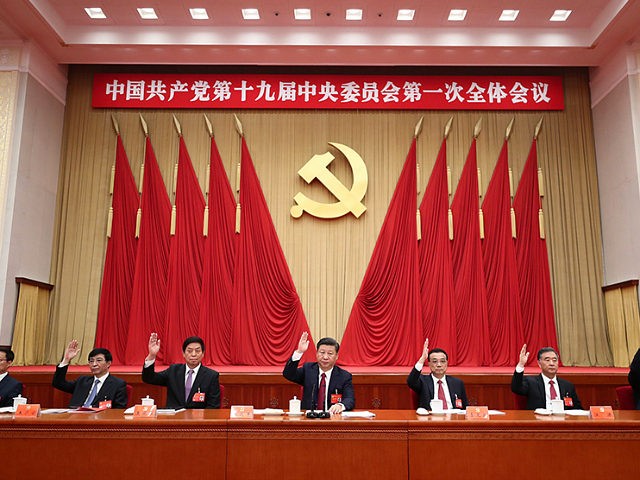China announced on Sunday that the Communist Party would roll out a “national supervision commission” to ensure that Beijing can keep a closer stranglehold over its officials throughout the country, allegedly to further crack down on corruption within the Party.
Chinese state media announced the move shortly after the Communist Party of China (CPC) Congress last week, which culminated in the appointment of a new head of the Central Commission for Discipline Inspection (CCDI), the national anti-corruption agency. The CPC also featured the ascent of President Xi Jinping to the status of predecessors Mao Zedong and Deng Xiaoping, the only three men mentioned by name in the party’s constitution.
The fight against vaguely-defined “corruption,” of which the regime has found many of Xi’s political foes guilty, is part of the larger imposition of Xi’s “Socialism with Chinese Characteristics” ideology, which requires a complete submission of the state to Xi’s will, as detailed in his three-hour speech to the CPC.
China’s state-run Global Times reports that the “national supervision commission” will officially take shape next year, operating in tandem with the CCDI at the local level. The commission, the report reads, “will be set up by the People’s Congress at provincial, city and county-levels across the country, to ensure that ‘all public servants exercising public power’ are subject to supervision, according to the plan.”
“All provinces, regions and cities must closely connect regional practices, integrate reform pilot scheme experience, implement the overall plan according to the decision of the party’s Central Committee, and promote organizational integration,” according to a report by Xinhua, another state-controlled news outlet.
The new commission will reportedly share responsibility with the CCDI, but they will not compete for power. Rather, the addition of a new bureaucracy to fight alleged corruption will expand the influence of those at the highest levels of the CPC leadership.
The new agency was necessary to fight “schemers” and “plotters” undermining communism, Xinhua argued, according to Reuters.
The new head of the CCDI, Zhao Leji, used his first major chance to address the nation to call for a “sweeping victory” against corruption. “Members of the CCDI Standing Committee need to uphold the Party leadership along with the good practices and experience of their predecessors, to ensure a sweeping victory over corruption,” Zhao reportedly said, according to the Global Times.
Zhao emphasized that promoting Xi’s “Socialism with Chinese Characteristics” ideology was a major part of fighting the alleged corruption within the Communist Party.
Zhao took over last week following the end of Wang Qishan’s term running the anti-corruption agency, a term marked by thousands of arrests for crimes as substantial as bribery and as small as lavish spending in an official’s private life. Reuters speculates that Zhao will “take a most institutional approach” than Wang as a new chief.
Wang’s name was also removed from the Chinese Communist Party’s Politburo at the end of the CPC Congress. Most reports on the end of his tenure noted his age; Xi has made 68 an unofficial retirement age for his high-ranking officials. Wang himself, however, has faced independent allegations of corruption. Guo Wengui, an exiled Chinese billionaire who often uses the nom de plume Miles Kwok, accused Wang and his family of privately enriching themselves to the tune of millions through ties to the Chinese corporation HNA. There is no evidence that the Chinese government is investigating Wang, instead leveling significant criminal charges against Guo.
Wang intensified the fight against “corruption” in 2015, arresting thousands of CPC officials. Many were known opponents or political rivals of Xi Jinping’s and many faced accusations as minor as “accepting festival gifts” and “lavish spending at weddings.” At its peak, the corruption purge resulted in the arrest of 2,000 people in one week, with further arrests of 14 generals the week after.
Xi’s regime subsequently published a book of “confessions” by those arrested to serve as a guild and warning to those who may be tempted by illicit activity.

COMMENTS
Please let us know if you're having issues with commenting.